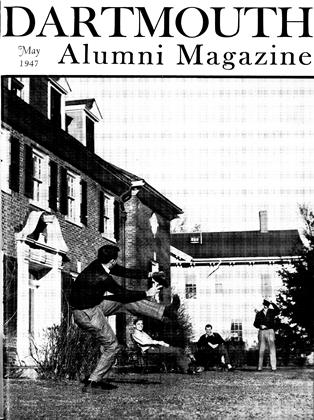ABOUT a year ago The Grolier Club of New York exhibited what they, after much consideration, called OneHundred Influential American Books printed before 1900. The descriptive catalogue of this exhibition is now in my hands and it is a honey. Only 600 copies were printed, and my guess is that it is already a scarce book. The books include The BayPsalm Book, The New England Primer,The Farmer's Almanac .... for.... 1793,Two Years Before the Mast, Ragged Dick by Horatio Alger Jr., Montgomery Ward's first Mail Order Broadside, and the last is Thorstein Veblen's The Theory of theLeisure Class. Some of the copies exhibited were priceless, as for instance George Washington's inscribed copy of The Federalist which was especially bound for Alexander Hamilton and presented by him, through Madison, to our first President. It is of special interest to Dartmouth men that Thomas W. Streeter '04, chairman of the executive committee of the Friends of the Dartmouth Library, and well-known bibliographer, wrote the notes for 32 of the books. A wonderful collector's item for all interested in Americana.
I found extremely interesting Elliott Arnold's Blood Brother (Duell, Sloan & Pearce, 1947), a long historical novel dealing with the relations between the Chiricahua Apaches, led by the magnificent war leader Cochise, and the Americans, whose agent, Tom Jeffords, finally settled the bloody war which lasted from 1856 to 1872. The scene is Arizona and New Mexico. The author has followed fact very closely, and some of the conversations in the book are the actual conversations as reported by participants in later years. Only the women characters were invented, though Jeffords confided to friends later that he had been intimate with an Apache girl and that he had been "cared for" by an American woman. The Apache chief Cochise steals the book and, with the exception of his blood brother Jeffords, is easily the most magnificent figure in the whole historical episode. He never broke his word, and the savagery of his men and of himself was due to constant betrayal of promises made by the whites. I have not seen any reviews of this book but it is one of the best that I have read in many a day. One of the great authorities of the southwest, Dr. Frank C. Lockwood, says of this novel: "I wish to commend the book for four things: the timeliness and nobility of the theme—the blood brotherhood of all men; the depth and breadth of research; the masterly organization of material; and the flashing originality of style—forceful, swift, full of color, yet characterized, also, by high seriousness of purpose."
For Thoreau lovers I recommend Discovery At Walden by Roland Wells Robbins, which may be ordered for $2.50 from the author in Concord, Massachusetts. This book, illustrated, tells of Robbins' final and definite discovery of the real site of Thoreau's cabin at Walden Pond.
Those who like the light and deft touch will enjoy Max Beerbohm's Mainly on theAir, issued by Knopf in 1947. This is a new book of essays and broadcasts mainly about London, dating from 1922 to 1945. A distinguished little book.
An autobiography which will keep you glued to its pages is Melvin Hall's Journeyto the End of an Era (Scribner's, 1947)- Hall was born a Vermonter (Brattleboro) and had all the advantages that money brings. He made his first trip to Europe when he was twelve and if you want to know what motoring was like in the early days read about the Halls' fantastic automobile trips in America, Asia, and Europe. The family motored around the Baltic, through the Balkans where there were often no roads at all, and in Persia (now Iran). Hall fought in both world wars and has some new comments on the famous Billy Mitchell (in whose house in Milwaukee I recently had lunch with Frank T. Frey '3B). His description of Persia, where he spent several happy years, reveals much about a country that is still unknown to most Americans. I found especially interesting his story of the fabulous Wassmann, the German "Lawrence," who caused the British so much trouble during World War I. A book you won't want to miss.
 View Full Issue
View Full Issue
More From This Issue
-
 Article
ArticleTHE ALASKA HIGHWAY
May 1947 By LAURENCE W. LOUGEE '29 -
 Article
ArticlePROPAGANDA AND THE CRISIS
May 1947 By MICHAEL E. CHOUKAS '27 -
 Class Notes
Class Notes1918
May 1947 By ERNEST H. EARLEY, DONALD L. BARR -
 Article
ArticleJames Parmelee Richardson
May 1947 By JOSEPH W. GANNON '99 -
 Class Notes
Class Notes1921
May 1947 By DONALD G. MIX, ROBERT M. MACDONALD -
 Class Notes
Class Notes1937
May 1947 By JOHN H. DEVLIN, ARTHUR H. RUGGLES JR.
HERBERT F. WEST '22
-
 Article
ArticleHanover Browsing
March 1940 By HERBERT F. WEST '22 -
 Article
ArticleHanover Browsing
December 1945 By HERBERT F. WEST '22 -
 Books
BooksUNPROMISED LAND
May 1948 By Herbert F. West '22 -
 Books
BooksTHE WINOOSKI,
June 1949 By Herbert F. West '22 -
 Article
ArticleHanover Browsing
February 1951 By HERBERT F. WEST '22 -
 Article
ArticleHanover Browsing
June 1954 By HERBERT F. WEST '22
Article
-
 Article
ArticleAlumni Articles
April 1950 -
 Article
Article17th Century Chair Is Given to College
June 1954 -
 Article
ArticleWebsteriana
April 1974 -
 Article
ArticleThey Tried to Keep Dartmouth in Connecticut
January, 1930 By Isabel Foster -
 Article
ArticleNoteworthy Visitor
MAY 2000 By Jennifer Whitcomb ’00 -
 Article
ArticleIMAGINING THE NEW WORLD
NOVEMBER 1989 By Professor Beatriz Pastor

